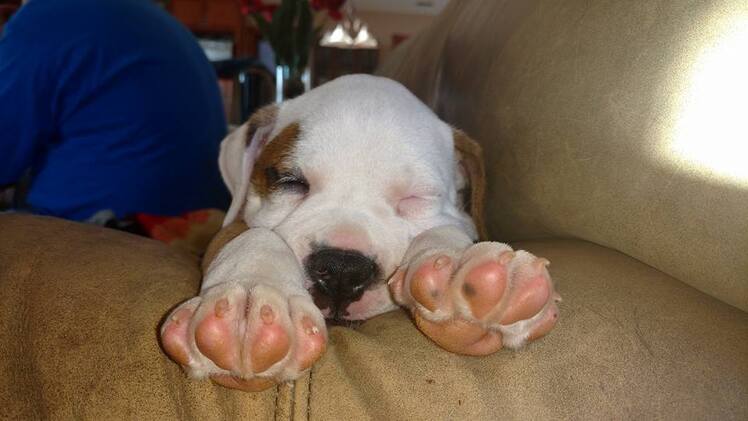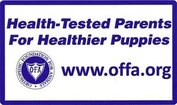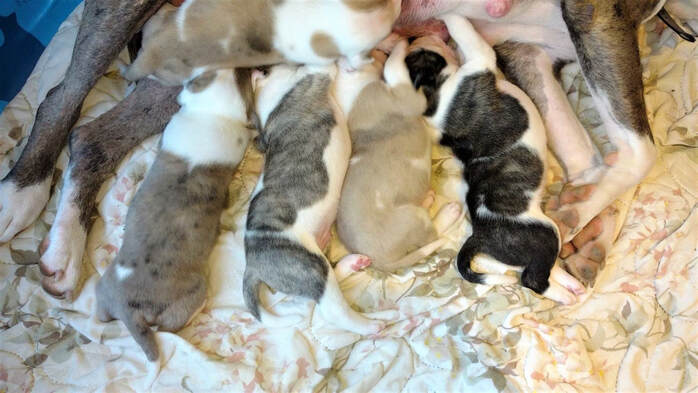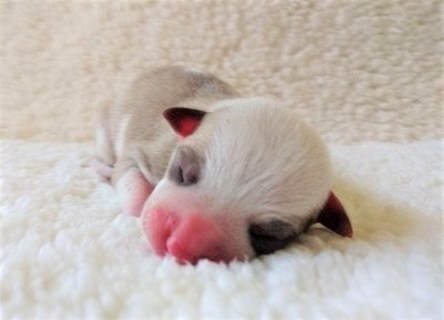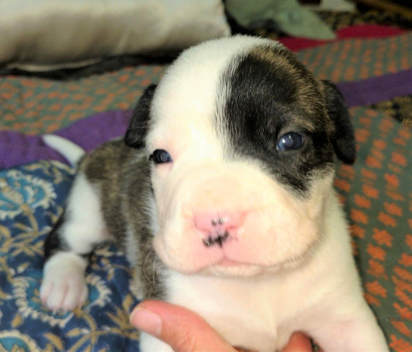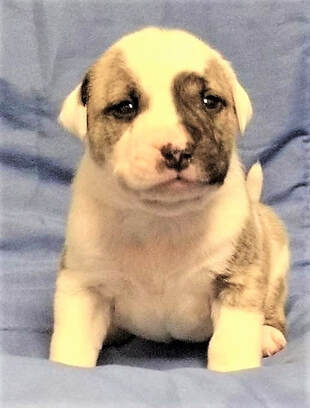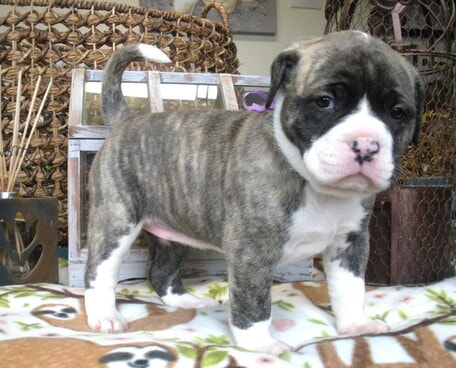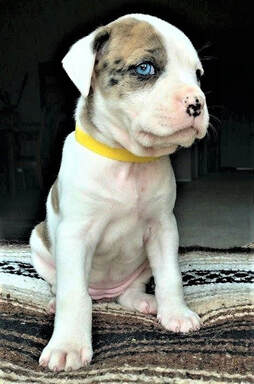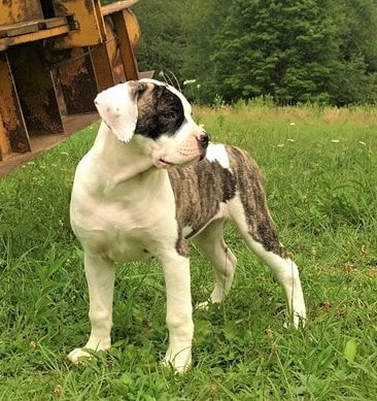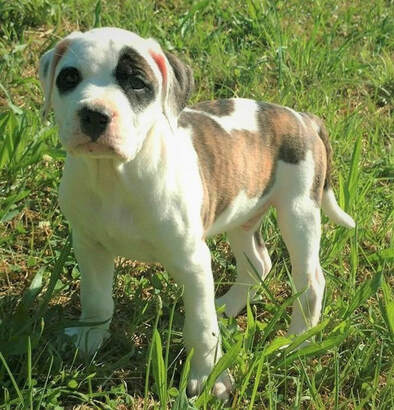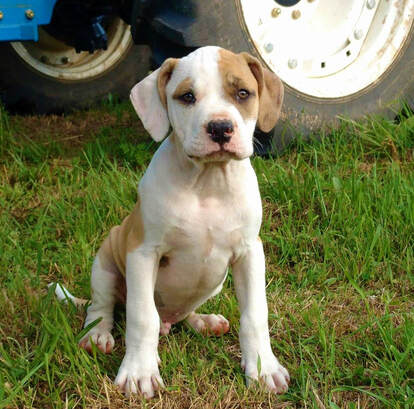This website is best viewed on a PC.
FROM PUPPY DEVELOPMENT TO POTTY TRAINING
A timeline of the Alapaha Blue Blood Bulldog whelping process. From "heat" cycle to birth (whelp).
PLANNED MATING . PREGNANCY . GESTATION . WHELP
PLANNED MATING . PREGNANCY . GESTATION . WHELP
|
|
Every 6 months, 2 times a year generally a bitch will come into "heat," the entire "heat" cycle lasts approximately 21 days. During this time a breeder will have an idea depending on the female when the "heat" cycle should begin, and watching for signs, this is called "reading the bitch" and being aware when she's ovulating, and watching the male interact with her. There are a few ways to determine the time of ovulation, which are done by measuring luteinizing, progesterone hormone and vaginal cytology (smears) to pinpoint when ovulation occurs and the optimal time to plan the breeding. Generally, on day 9 from the start of the "heat" cycle to day 15, she is ready to mate, but not all females are the same. |
An approximate due date for whelping (birthing) will be from 58- 63 days from breeding so we mark our calendar accordingly. We pair our female with our male every other day during her ovulation period. There are a few different ways a veterinarian can confirm pregnancy, ie. a blood test, an ultrasound and an x-ray. In the lab, a blood test can be done at 22 - 27 days gestation that measures the hormone levels called "Relaxin." This hormone is produced by the developing placenta following implantation of the embryo, and can be detected in the blood in most bitches as early as 22-27 days post-breeding. An Ultrasound can be done at 30 days from the time of breeding to confirm pregnancy. An x-ray can be done around 45 - 58 days, when the puppies bones are calcified enough to be visible on an x-ray, and the vet can give an estimate of how many there may be and their positioning.
The expectant mother will have an increase in her appetite, frequent urination, and weight gain over the next several weeks. Introducing her to the whelping box, which is in a quiet place in our home, allowing her to get accustomed by sleeping, and resting inside of it, and having her food/water nearby. She will begin sleeping more and stretching a lot as she gets bigger.
***See Puppy Supply Basics for Puppy Toys, Food, Crate, and Items We Use***
Upon the week of her due date, we will keep a very close eye prepared with all the necessities needed for whelping and the vet's emergency number, just in case. A dog's normal temperature is between 101 - 102.5 Fahrenheit (38.3 - 39.2 degrees Celsius). Breeders can use a drop in the bitches temperature as an indicator that labor is close at hand. This is somewhat predictable. In the last trimester of her pregnancy, due to hormone levels, the expectant mother will usually have a temperature around 100 degrees. When her temperature drops to 98 or lower, labor should start within 24 hours or less.
Signs of labor are: nesting-digging-burrowing, pacing, dilated pupils, hiding in secluded dark areas and panting, etc., We'll watch for these signs and then confine her to the whelping box. We don't interfere so that the mother's full instincts can kick-in, but we are there to help if needed. If possible, the exact time of birth is logged and the weight of each puppy. Logging the birth is important, if any problems should arise with the mother this will aid the vet in knowing at what stage she is in whelping.
We monitor the new puppies around the clock, and we all help out. I (Susie) sleep near the mom, and her new babies for the first three weeks of life to ensure their safety. They are so tiny sometimes mom doesn't feel them when she goes to lay back down or shifting to let them nurse, etc.
The new mom will lick and clean her puppies right after they're born. This stimulates them as well as cleans their nose, and mouth so they can start breathing. She will separate their umbilical cord and should be left to do so on her own. Sometimes new mothers need help or we can do it for her if she gets too rough. Depending on her contractions, she can give birth very quickly, it can also take up to three hours in-between. We place the puppies in a "warming box" to keep them warm and safe. This prevents them from getting crushed if she's moving a lot and helps keep them clean as well.
New puppies are born hungry and need to nurse as soon as possible right after birth. They receive the protein-rich colostrum that's full of vital maternal antibodies that protect the puppies from all sorts of diseases, and gives them what is known as "passive" or "maternal immunity" that the mother produces directly after whelping. This is vital for new puppies since they're born with an immature immune system. They will nurse every one to two hours. We rotate them to ensure they all get to nurse. The mother's milk "drops" by the next day. It has everything they need and will carry them over. Weaning starts by three weeks of age. She'll continue to produce milk until they are fully weaned by seven weeks of age. She will be very protective of her new brood. Soiled linens are changed right away while mom and her puppies stay clean, well fed and safe.
The new mom will lick and clean her puppies right after they're born. This stimulates them as well as cleans their nose, and mouth so they can start breathing. She will separate their umbilical cord and should be left to do so on her own. Sometimes new mothers need help or we can do it for her if she gets too rough. Depending on her contractions, she can give birth very quickly, it can also take up to three hours in-between. We place the puppies in a "warming box" to keep them warm and safe. This prevents them from getting crushed if she's moving a lot and helps keep them clean as well.
New puppies are born hungry and need to nurse as soon as possible right after birth. They receive the protein-rich colostrum that's full of vital maternal antibodies that protect the puppies from all sorts of diseases, and gives them what is known as "passive" or "maternal immunity" that the mother produces directly after whelping. This is vital for new puppies since they're born with an immature immune system. They will nurse every one to two hours. We rotate them to ensure they all get to nurse. The mother's milk "drops" by the next day. It has everything they need and will carry them over. Weaning starts by three weeks of age. She'll continue to produce milk until they are fully weaned by seven weeks of age. She will be very protective of her new brood. Soiled linens are changed right away while mom and her puppies stay clean, well fed and safe.
NEWBORN PUPPIES
|
|
!!!Puppy Breath!!! A newborn Alapaha Blue Blood Bulldog puppy will fit in the palm of your hand. Their eyes and ears are tightly shut. The puppies do lots of sleeping and nursing small amounts off/on every one too two hours. We love all those cute lil'puppy grunts they make, so sweet! They grow rapidly at this stage. |
Once you have decided on your new puppy's name, let us know so that we may begin calling him/her by it. A puppy will pick-up on their name very quickly!
1st Week The puppies have gained a bit more weight. Their ears are beginning to fold down and will slowly open over the next several days. The puppies can crawl around on their bellies pretty good. They are very impressionable in the first 16 weeks of life during brain development. We have started their "imprinting process", lots of handling at this stage, touching their feet, tail, ears and mouth and turning them over. This helps in molding their personalities while this builds trust through human interaction.
|
2nd WeekBy now, their eyes have begun to open and they can see us. They will become keener as they mature. I give them their first deworming at this stage. This is our favorite part of their development!
|
3rd Week Now the puppies are tumbling, pouncing and tugging at their blanket. Their little personalities are beginning to come to light. They can potty on their own. They get their first feeding of moistened puppy kibble at this stage. Their teeth are coming in and their ears have completely opened. They are quite vocal, barking, growling and whining. It's very entertaining watching them as they discover being littermates is fun!
|
4thWeekTheir second deworming is given during this stage. They enjoy our interaction and affection.
|
5th WeekThe puppies are rambunctious and very playful, playing with their toys. They're eating moistened puppy kibble and nursing too. We add a vitamin supplement to their moistened food for an added boost. They're bundles of adorable playfulness!
|
6th Week They receive their 3rd deworming and start their booster vaccines. Our veterinarian gives mom and the puppies a thorough looking over. They're eager to learn at this stage and respond to training very quickly. This is the time when we start their Potty-Bells training, crate and leash training. Weather permitting, the pups get to explore the great outdoors for the first time, exposing them to different surfaces and the animals we have here on or farm. This is an exciting time because we allow our visitors to meet them now!
|
7th Week All of the puppies are fully weaned now. Our pack of other dogs we have serve as their babysitters/playmates and for socialization. We continue their training sessions; they have learned a lot at this stage in their development. Their attention span will continue to increase as they grow, for this reason, we limit training to 10-15 minute intervals, usually 2-3 times a day.
|
8th WeekAt this age, we evaluate each puppy on their conformation and for placing them with their future families. They are full of energy, playing tuggy, chasing and roughhousing. These are great learning experiences for them because playing helps them develop social and physical skills. When a bite is too hard and the other puppy yelps out in pain, they begin to learn how to control the force of their biting. As they progress, they develop random spots on and under their coat, ears, around the eyes and belly, while their skin takes on a slightly pink undertone, which is more visible around their muzzle area. Their nose and lips can be completely black or liver and have some pink pigment but mostly dark per breed standards.
The puppies will still continue to do a lot of sleeping and growing. By 4 months they begin to lose their puppy teeth; the canines come out first, followed by new adult teeth that will quickly replace them. Their natural "guarding instinct" also begins to show approximately 3.5 to 4 months old where they may become standoffish with newcomers, and will bark if they see something unfamiliar such as a stranger outside or walking up, etc. Alapaha Blue Blood Bulldogs reach maturity around 2 years of age. |
Approximately one year of age they should achieve their full height. By the second year of maturity they should really begin to "bulk out" or acquire their muscular physique.
We are available day and night for the families of our puppies with lifetime support, and can ask us for advice throughout their entire lives. We like to stay in contact with the owners, and love getting updates and photos as your fur baby progresses!
Your puppy will need a few more vaccinations upon turning 9 weeks old, and the rabies vaccine which is required at 12 weeks or older. State, and local regulations determine the age when all dogs must be Rabies vaccinated.
DO NOT take your new puppy to pet stores, dog parks, rest areas or anywhere other dogs may have been, allowing them walk around on the ground/floors until they have completed their series of vaccinations!!!
There are some viruses out there that can be fatal to a young puppy! Consult your veterinarian as to when is the best time to allow your puppy around other dogs.
***Once you get your new puppy home, start their obedience training right away, being clear and consistent.*** Alapahas are extremely intelligent dogs and very food motivated! We have had excellent success using only small pieces of String Cheese as a more (high value treat) for challenging commands, or their own dog food paired with a training "Clicker" as our tools for training. (We give a Clicker to the families of our puppies).
These dogs LOVE to learn and the interaction it brings with their owners. From our experience, they are very enthusiastic about their training sessions and learn quickly!
There is no need to encourage your puppy to be protective, they do not need it!
HOUSE PROOFING!
Supervise your new puppy at all times and do not let them have free rein in the home! Just like having a toddler, you need to prepare your household inside and outside in a similar manner. Take up any electrical cords and small objects that could be chewed, swallowed and cause choking. Make sure there's no chemicals your puppy could lick, such as toxic antifreeze (it has a sweet taste which is appealing to pets) or any liquid containers the puppy could puncture and ingest the poisonous contents i.e. oils, glues or pastes, etc. If you have fencing, be aware of any gaps or areas where your puppy could escape and fix them securely. Be mindful of any toxic plants that your puppy could get a hold of.
GORILLA GLUE I = Deadly! Poison Hotline On This Product
Symptoms: https://wagwalking.com/condition/gorilla-glue-poisoning
CRATE TRAINING:
Puppies under the age of 6 months should not be left in their crate longer than 3 to 4 hours at a time. On average a puppy can "hold it" for about an hour per every month of age. For example, a 2-month-old puppy can usually wait 2 hours to relieve their bladder. A full grown dog will generally need to “relieve” themselves approximately 3 to 5 times a day. Since your new puppy has not developed control over their bowel and bladder, they need potty breaks frequently! Start your puppy out right away with a routine that best fits your schedule; they will acclimate to it within a few days as they adjust to your routine and their new environment.
Begin by placing their crate nearest the door that you will be using to let them outside. Depending on the season, make sure your new puppy will not be exposed to any cold drafts. Always be patient, clear, firm and consistent with the training. They will most likely whine and bark in their crate while they are adjusting to their new surroundings and environment, since being without their litter-mates. Do not give into their protesting; this will only reinforce the unwanted behavior. Avoid eye contact and any verbal communication before going up to the crate each time to let them out. However, you absolutely always want to check to make sure that your fur baby is doing well in their crate. When they wake up from a nap, make sure they are settled and quiet before allowing them out of their crate. This will make life with your new puppy less stressful for everyone. We have found, this method teaches the puppy to be calm and patiently wait to be let out. Consistency is the key! The objective of this approach is to achieve minimal excitability and low energy. When you are calm, that same energy will be projected to your puppy.
By 8 weeks of age, the puppy will sleep roughly 5 hours at night. However, it is ideal to take your puppy outside to go “potty” every two hours. This means directly after they wake-up, after heavy play and 25-30 minutes after eating and drinking. Carry them to the same spot in your yard that you would prefer for them to do their "business." The scent of their waste will stimulate them to "go." What works at our house is feeding our puppies three times daily as much as they will eat. We offer them dry kibble at 5:30 a.m., 12 p.m. We offer them dinner no later than 5 p.m. This allows the puppies plenty of time to "clean out" before bedtime. This also helps to regulate their bowel movements, making them more predictable.
Circling and/or sniffing the floor is a sign that your puppy needs to go “potty.” If you see them doing this, pick them up immediately and tell them no! Take your puppy to the "spot" outside that you want them to use. Never rub your puppy’s nose in their waste for having had an "accident" on the floor and never spank them for it. They will eventually develop the muscles needed to control their bladder/bowel movements. We will sometimes hold off on giving them water right before bedtime and will let them out one last time around 9:30 -10 p.m. What has produced good results for us, as part of their crate training, is in the morning and once the puppies are quiet, they are allowed out of their crate without any talking and then taken outside by being picked up or lead outdoors to an appointed spot.
As your puppy matures and is able to “hold it” for longer periods at a time, we suggest taking them outside to do their “business” prior to letting them have free run in the house. We advise starting them out in a sectioned off area in your home, preferably with tile or vinyl flooring, allowing your pooch no more than 15 minute intervals of indoor playtime, then it’s back outdoors to potty. We recommend using the crate divider until you are positive that your puppy is housebroken. You will know the limits of your puppy; thy are all different. Consistency is the key.
FEEDING . POTTY BELLS TRAINING
By 8 weeks of age, your puppy will eat approximately 1 to 1.5 cups of dry Puppy kibble, making positive it is formulated specifically for Large Breed Puppies! Do Not underfeed your new puppy. Allow them 3 meals daily. This breed will not overeat! You will know they are still hungry if they are licking eagerly at their food bowl and searching for more. This breed drinks a lot of water, so always have fresh water available. Your new puppy will sleep approximately 5 hours through the night at 8 weeks old. However, during the day they will need to go potty every two hours. This means directly after they wake-up, after heavy play and about 25-30 minutes after eating and drinking. Carry them to the same spot in your yard that you prefer them to do their "business," the scent of their waste will stimulate them to "go." What works for us is we feed them as much as they can eat at 5:30 a.m., then again at 12 p.m. and we feed them their dinner no later than 5 p.m. so they have plenty of time to "clean out" before bedtime. This helps to regulate their bowel movements making it more predictable. Having someone there that can let your new puppy outside if you can not be there, or if possible, taking your lunch break where it allows you to go home, and let your puppy out is ideal too. Signs of your puppy about to go "potty" are: circling and/or sniffing the floor. If you see them doing this, say NO! pick them up immediately, and take them to their "spot" outside. Never rub your puppy's nose in their waste for having had an "accident" on the floor or spank them, they can't help it and will eventually develop the muscles needed to control their bladder/bowel movements.
We will sometimes hold off on their water right before we put them up for the evening. The routine that we found works best for us is, at 5:30 a.m. we usually get a cup of coffee, and once the puppy is quiet, we go up to their crate without any talking, in a calm manner open door, pick them up and set the puppy right in front of the potty bells, point at the bells saying "outside," if training them to those. Puppies learn very quickly and understand to be calm before being let out, and expect this as part of their routine, which also aids in teaching them to "hold it."
Your puppy should eventually ring the bells without encouragement, after repeating this process on a consistent basis during every outing. Once their nose touches the bells we do the "Clicker" (as shown in our potty bell training videos) open the door immediately, and carry them to the appointed spot or you can lead them, you will know the limits of your puppy, they are all different. Consistency pays off! By 3 .5 to 4 months they should be doing it on their own.
See our Video of Jack at 3.5 months ringing the potty bells, and demonstrations on training. We love the potty bells because it takes out all the guesswork, they let us know when they have to potty right away by going up, and ringing the bells.
STAIN REMOVAL . CARPET & ROOM FRESHENER
Scrubbing Bubbles Citrus Scent, Yes, bathroom cleaner spray. It doesn't change the color of our carpet, works great for getting out poo, puke and urine stains, and many other spills! Spray it, wait a minute or two then step/blot with a rag or can use a scrub brush! Also, Dawn brand liquid dish detergent, use about half a cap full diluted with water, and have a scrub brush. For a fresh scent we like Glade Carpet & Room Refresher.
Remember to shower your puppy with lots of love and attention. These dogs are big cuddlers, and they LOVE their people, and want nothing other than your affection, and praise. They will grow up, and be a great protector of your family, and other pets, a loyal, and loving friend to everyone they share their home with!
See our BLOG on types of food, crate advice, and more potty training advice, and toys, etc.
Your puppy will need a few more vaccinations upon turning 9 weeks old, and the rabies vaccine which is required at 12 weeks or older. State, and local regulations determine the age when all dogs must be Rabies vaccinated.
DO NOT take your new puppy to pet stores, dog parks, rest areas or anywhere other dogs may have been, allowing them walk around on the ground/floors until they have completed their series of vaccinations!!!
There are some viruses out there that can be fatal to a young puppy! Consult your veterinarian as to when is the best time to allow your puppy around other dogs.
***Once you get your new puppy home, start their obedience training right away, being clear and consistent.*** Alapahas are extremely intelligent dogs and very food motivated! We have had excellent success using only small pieces of String Cheese as a more (high value treat) for challenging commands, or their own dog food paired with a training "Clicker" as our tools for training. (We give a Clicker to the families of our puppies).
These dogs LOVE to learn and the interaction it brings with their owners. From our experience, they are very enthusiastic about their training sessions and learn quickly!
There is no need to encourage your puppy to be protective, they do not need it!
HOUSE PROOFING!
Supervise your new puppy at all times and do not let them have free rein in the home! Just like having a toddler, you need to prepare your household inside and outside in a similar manner. Take up any electrical cords and small objects that could be chewed, swallowed and cause choking. Make sure there's no chemicals your puppy could lick, such as toxic antifreeze (it has a sweet taste which is appealing to pets) or any liquid containers the puppy could puncture and ingest the poisonous contents i.e. oils, glues or pastes, etc. If you have fencing, be aware of any gaps or areas where your puppy could escape and fix them securely. Be mindful of any toxic plants that your puppy could get a hold of.
GORILLA GLUE I = Deadly! Poison Hotline On This Product
Symptoms: https://wagwalking.com/condition/gorilla-glue-poisoning
CRATE TRAINING:
Puppies under the age of 6 months should not be left in their crate longer than 3 to 4 hours at a time. On average a puppy can "hold it" for about an hour per every month of age. For example, a 2-month-old puppy can usually wait 2 hours to relieve their bladder. A full grown dog will generally need to “relieve” themselves approximately 3 to 5 times a day. Since your new puppy has not developed control over their bowel and bladder, they need potty breaks frequently! Start your puppy out right away with a routine that best fits your schedule; they will acclimate to it within a few days as they adjust to your routine and their new environment.
Begin by placing their crate nearest the door that you will be using to let them outside. Depending on the season, make sure your new puppy will not be exposed to any cold drafts. Always be patient, clear, firm and consistent with the training. They will most likely whine and bark in their crate while they are adjusting to their new surroundings and environment, since being without their litter-mates. Do not give into their protesting; this will only reinforce the unwanted behavior. Avoid eye contact and any verbal communication before going up to the crate each time to let them out. However, you absolutely always want to check to make sure that your fur baby is doing well in their crate. When they wake up from a nap, make sure they are settled and quiet before allowing them out of their crate. This will make life with your new puppy less stressful for everyone. We have found, this method teaches the puppy to be calm and patiently wait to be let out. Consistency is the key! The objective of this approach is to achieve minimal excitability and low energy. When you are calm, that same energy will be projected to your puppy.
By 8 weeks of age, the puppy will sleep roughly 5 hours at night. However, it is ideal to take your puppy outside to go “potty” every two hours. This means directly after they wake-up, after heavy play and 25-30 minutes after eating and drinking. Carry them to the same spot in your yard that you would prefer for them to do their "business." The scent of their waste will stimulate them to "go." What works at our house is feeding our puppies three times daily as much as they will eat. We offer them dry kibble at 5:30 a.m., 12 p.m. We offer them dinner no later than 5 p.m. This allows the puppies plenty of time to "clean out" before bedtime. This also helps to regulate their bowel movements, making them more predictable.
Circling and/or sniffing the floor is a sign that your puppy needs to go “potty.” If you see them doing this, pick them up immediately and tell them no! Take your puppy to the "spot" outside that you want them to use. Never rub your puppy’s nose in their waste for having had an "accident" on the floor and never spank them for it. They will eventually develop the muscles needed to control their bladder/bowel movements. We will sometimes hold off on giving them water right before bedtime and will let them out one last time around 9:30 -10 p.m. What has produced good results for us, as part of their crate training, is in the morning and once the puppies are quiet, they are allowed out of their crate without any talking and then taken outside by being picked up or lead outdoors to an appointed spot.
As your puppy matures and is able to “hold it” for longer periods at a time, we suggest taking them outside to do their “business” prior to letting them have free run in the house. We advise starting them out in a sectioned off area in your home, preferably with tile or vinyl flooring, allowing your pooch no more than 15 minute intervals of indoor playtime, then it’s back outdoors to potty. We recommend using the crate divider until you are positive that your puppy is housebroken. You will know the limits of your puppy; thy are all different. Consistency is the key.
FEEDING . POTTY BELLS TRAINING
By 8 weeks of age, your puppy will eat approximately 1 to 1.5 cups of dry Puppy kibble, making positive it is formulated specifically for Large Breed Puppies! Do Not underfeed your new puppy. Allow them 3 meals daily. This breed will not overeat! You will know they are still hungry if they are licking eagerly at their food bowl and searching for more. This breed drinks a lot of water, so always have fresh water available. Your new puppy will sleep approximately 5 hours through the night at 8 weeks old. However, during the day they will need to go potty every two hours. This means directly after they wake-up, after heavy play and about 25-30 minutes after eating and drinking. Carry them to the same spot in your yard that you prefer them to do their "business," the scent of their waste will stimulate them to "go." What works for us is we feed them as much as they can eat at 5:30 a.m., then again at 12 p.m. and we feed them their dinner no later than 5 p.m. so they have plenty of time to "clean out" before bedtime. This helps to regulate their bowel movements making it more predictable. Having someone there that can let your new puppy outside if you can not be there, or if possible, taking your lunch break where it allows you to go home, and let your puppy out is ideal too. Signs of your puppy about to go "potty" are: circling and/or sniffing the floor. If you see them doing this, say NO! pick them up immediately, and take them to their "spot" outside. Never rub your puppy's nose in their waste for having had an "accident" on the floor or spank them, they can't help it and will eventually develop the muscles needed to control their bladder/bowel movements.
We will sometimes hold off on their water right before we put them up for the evening. The routine that we found works best for us is, at 5:30 a.m. we usually get a cup of coffee, and once the puppy is quiet, we go up to their crate without any talking, in a calm manner open door, pick them up and set the puppy right in front of the potty bells, point at the bells saying "outside," if training them to those. Puppies learn very quickly and understand to be calm before being let out, and expect this as part of their routine, which also aids in teaching them to "hold it."
Your puppy should eventually ring the bells without encouragement, after repeating this process on a consistent basis during every outing. Once their nose touches the bells we do the "Clicker" (as shown in our potty bell training videos) open the door immediately, and carry them to the appointed spot or you can lead them, you will know the limits of your puppy, they are all different. Consistency pays off! By 3 .5 to 4 months they should be doing it on their own.
See our Video of Jack at 3.5 months ringing the potty bells, and demonstrations on training. We love the potty bells because it takes out all the guesswork, they let us know when they have to potty right away by going up, and ringing the bells.
STAIN REMOVAL . CARPET & ROOM FRESHENER
Scrubbing Bubbles Citrus Scent, Yes, bathroom cleaner spray. It doesn't change the color of our carpet, works great for getting out poo, puke and urine stains, and many other spills! Spray it, wait a minute or two then step/blot with a rag or can use a scrub brush! Also, Dawn brand liquid dish detergent, use about half a cap full diluted with water, and have a scrub brush. For a fresh scent we like Glade Carpet & Room Refresher.
Remember to shower your puppy with lots of love and attention. These dogs are big cuddlers, and they LOVE their people, and want nothing other than your affection, and praise. They will grow up, and be a great protector of your family, and other pets, a loyal, and loving friend to everyone they share their home with!
See our BLOG on types of food, crate advice, and more potty training advice, and toys, etc.
For we were saved in this hope, but hope that is seen is not hope; for why does one still hope for what he sees? But if we hope for what we do not see, we eagerly wait for it with perseverance.
Romans 8:24-25-25 KJV
Read more: https://www.whatchristianswanttoknow.com/my-favorite-kjv-king-james-version-bible-scriptures-about-hope/#ixzz5BCQUztgn
